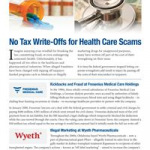No Write-Offs for Health Care Scams
A new factsheet from the U.S. Public Interest Research Group documents how health care and pharmaceutical corporations are able to write off the payments they make to settle charges of wrongdoing, such as fraud, on their taxes
Downloads

U.S. PIRG
Fresenius, Wyeth Pharmaceuticals, Amgen and Shands Healthcare allegedly engaged in illegal behavior that ripped off taxpayers or threatened the health of patients. Yet, rather than paying the full price of their misdeeds, federal law opens the door for companies that agree to settlements with government regulators to take a tax deduction for all or part of the cost of the payout.
How can this happen? Though corporations cannot legally write off public penalties or fines as tax breaks, companies may be able to write off payments made to settle allegations of wrongdoing by treating such payments as an ordinary and necessary business expense. This is because government agencies often fail to define a settlement’s deductibility in the formal settlement agreement. This ambiguity, clouded further by complicated case law, creates a settlement loophole corporations can take advantage of to secure a discount on their payout. According to the IRS, in settlements like those described above, “almost every defendant/taxpayer deducts the entire amount” as a business expense. A 2005 Government Accountability Office study of 34 companies’ settlements, worth more than $1 billion, found that 20 companies deducted some or all of their payments.
This is exactly what happened in the Fresenius case: the company ended up successfully deducting $353 million of its $385 million civil settlement – shifting over $100 million back onto taxpayers. And in more bad news for American taxpayers, Wyeth, Amgen and Shands Healthcare all entered into settlement agreements that, in the IRS’ experience, typically result in companies handing much of the bill for their misdeeds to everyday taxpayers.
Every dollar in tax savings companies enjoy in this way is ultimately paid for by ordinary Americans in the form of program cuts, increased federal debt, or higher taxes to make up the difference.
Taxpayers should not be forced to subsidize corporations that violate rules designed to protect the public from fraud, dangerous products, environmental damage or financial chicanery.
The federal government should require all settlement agreements to clearly define their tax consequences and to communicate that information clearly to the corporation, the IRS and the broader public. In addition, government agencies should:
- Make all settlement payouts non-deductible by default, including standard language in all agreements to that effect. The Environmental Protection Agency often does this and the Securities and Exchange Commission increasingly does the same.
- Publicly disclose all settlements on agency websites and include information about any portion that corporations have not been barred from deducting on their taxes.
- Require corporate filings to the Securities and Exchange Commission to explain whether any settlement payments were written off.
- Ensure “truth in advertising” by requiring regulators and corporations to disclose the after-tax amounts of settlements, a more accurate portrayal of the penalty a company will really pay.

